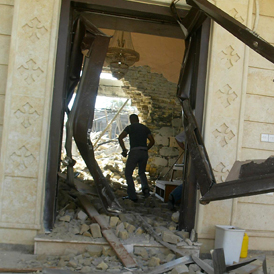Is life in Iraq getting any better?
As a series of coordinated bomb attacks leave dozens dead in Iraq, Channel 4 News hears from a doctor, a teenage Christian and a human rights activist about day-to-day life in the troubled country.

For many years deadly bomb attacks in Iraq dominated news bulletins and newspapers across the globe.
But as time has passed the world’s attention has shifted elsewhere, most notably Afghanistan and more recently Libya.
Eight years after the US and UK led invasion of the country, Channel 4 News has been speaking to people from different backgrounds and religions about everyday life in Iraq.
Dr Hussain Al-Musawi is a neurosurgeon who lives with his family in the mainly Shia city of Najaf in the southeast.
At least six people were killed there on Monday and dozens more injured when two car bombs exploded near a police building.
Dr Al-Musawi told Channel 4 News there are “no safe areas” in Iraq but people were intent on carrying on with their day-to-day lives regardless of the violence.
“Some days the situation is very good then in a single day you have explosions in eight cities. We don’t know why.”
You would have spoken to someone yesterday, and today you hear they’ve been killed. Lina Dawood
Dr Al-Musawi said he expected there to be better infrastructure following the end of the Iraq war.
He said that there was “definitely a lack of equipment” in his hospital which affected operations and patients.
Asked whether life was better or worse since the fall of Saddam’s regime he said he “couldn’t compare”.
“Saddam killed my father and in days of Saddam I was under supervision by security officials.
“Today I have some sort of freedom to talk about the general situation.”

‘Limited education’
Hanaa Edwar, a human rights activist who lives in Baghdad, told Channel 4 News that people are “very unhappy” with the progress being made in the country.
She said there were only four to six hours a day of electricity in the capital and that many people could not afford to use generators the rest of the time.
Hanaa added that the quality of education is very low: “This is due to limited school buildings. Sometimes in each school there will be two or three shifts a day which means only three or four hours of teaching for each child.
“On the outskirts of the city there can be between 50 to 120 children in each class with not enough desks and many buildings lack toilets.”
Hanaa also said unemployment among young people was causing unrest because there were few jobs outside of the police and military.
‘Worry makes you tired’
Lina Dawood, a Christian from Baghdad, was 10 years old when Iraq was invaded. She now works for the Foundation for Relief and Reconciliation in the Middle East.
She has grown up amid the sectarian violence which has caused death and destruction across the country.
“It’s not like when you see it on the news; it’s different when you are actually there.
“When my dad goes to work, me and my mum and my family don’t know if he will ever come back. When my mum goes to the shop I don’t know if she’ll make it there. All the time I call her, ‘where are you, what are you doing now?’
“You would have spoken to someone yesterday, and today you hear they’ve been killed.
“Worry makes you tired. You can’t study. It plays on your mind. You can’t focus on study because you are worried all the time.”